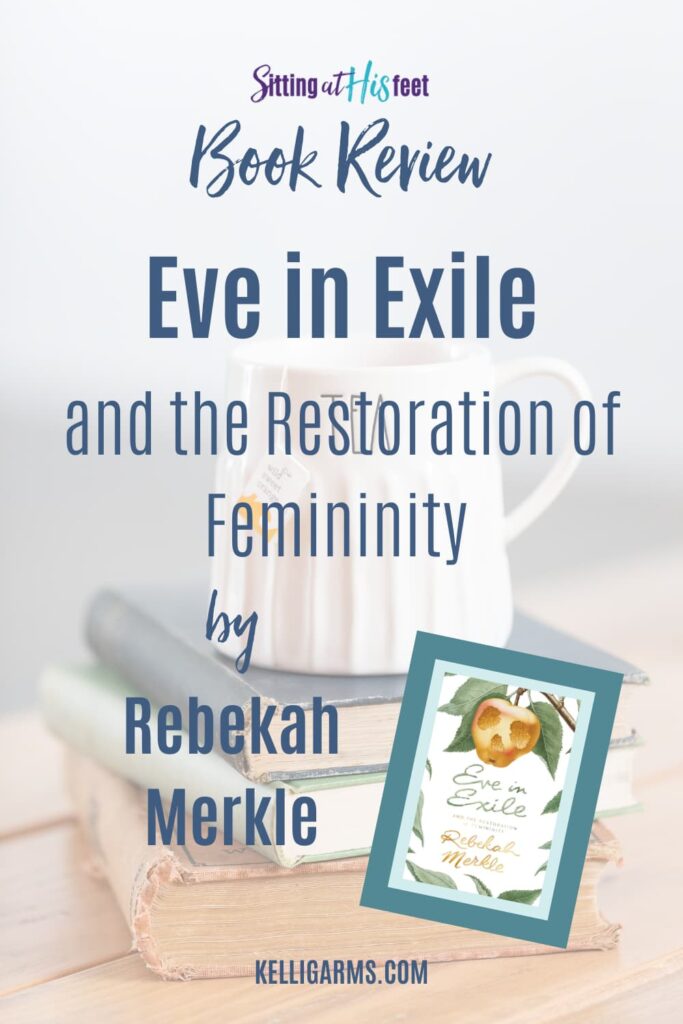Rebekah Merkle’s book, Eve in Exile, is clear, concise, and witty, making for a fun and easy read on a complicated topic: feminism.
Few books have left me with so much food for thought as Rebekah Merkle’s book Eve in Exile. In this book, Merkle explains some daunting and controversial passages of Scripture in a way I haven’t heard before. She also explains how women have been the drivers of our cultural downfall and how we can drive the rebuilding of our society. Merkle is clear, concise, and even funny at times in her unpacking of difficult topics, making the book an easy and enjoyable read.
She begins the book by reminding us that freedom does not mean we live without boundaries. Her analogy of a basketball game with no hoops or lines hits home as she compares it to our society’s current inability to define what a woman is. She says, “True freedom lies in the opportunity to pursue excellence, and that opportunity is dependent on the boundaries that define and restrict the entire field of endeavor” (10). Later in the book, she adds, “[…] we can grow, mature, and change, sure. But we can’t grow past the fixed limits that He has built into our natures” (99). It is a sobering thought as we wrestle with what our purpose is as women created in the image of God.
Part 1 of the Book
The book is divided into four sections that develop the purpose of women and how and why we have gone so wrong. The first section of the book explains some of the pitfalls. Whether it is longing for a fictional era or chasing a mythical idea of fulfillment, women have been the driving force behind the downfall of our society and culture. We long for a time we have only seen in the movies, and we have distorted our God-given drive into something completely disconnected from our purpose.
Part 2
In the second section of the book, Merkle delves into the history of feminism, but she does so in a way that makes the journey very clear. Her explanation makes it obvious that we would end up where we are long before we arrived. Going back to a “simpler” time will lead us to the same place we currently stand because the seeds were sown during that “simpler” time. Merkle doesn’t get into the weeds of a purely academic history, but instead, looks at the potential and legitimate causes of the different waves of feminism. While some of her ideas are purely opinion, they make sense when you follow her logic.
Merkle describes my dilemma with feminism so well when she points out that some of the causes the feminists took up were good, but how we accomplish those outcomes matters, and a feminist is never going to get there the same way a Christian should. She reminds us that, “Trajectory matters, and the trajectory of the feminist movement has been opposed to Christianity since day one. We need to get over the fact that sometimes we happen to agree with feminists on this or that issue. Just because we occasionally agree with the what does not mean we were ever agreed on the how or the why” (92).

Looking at the outcomes of feminism we are experiencing today and the fact that more women seem to be unhappy now than ever before, we must ask if feminism will ever deliver on its promises. After documenting the statistics, Merkle summarizes, “For the last fifty years, American women have chased the rainbow and the pot of happy has not turned up” (69). She adds, “We need to figure out what went wrong—not so that we can sit around and criticize our grandmothers, but so that we can figure out how to spare our daughters” (73).
Part 3 of the Book
In the third section, Merkle takes us back to Genesis to unpack our purpose. She points out that, “Design matters. The intent of the designer matters. And we women, as God’s creatures, are designed by Him to fulfill a particular role” (98). But that role may not look like what we have been led to believe it looks like. What does the Bible say we are designed to do? What does this look like for women in our current time? As she develops the ideas presented in the passage of subduing, filling, helping, and glorifying, she explains what the biblical terminology means and draws analogies that make those meanings clear. In this section, Merkle goes to great lengths to define the biblical view of submission.
Part 4
Merkle gives examples of ways women can fulfill their purpose in the fourth section of the book. She reminds the reader that one woman’s way of fulfilling her purpose may not look like her neighbor’s way, yet they can both be obedient to their callings of womanhood. While she talks about different ways we can subdue, fill, help, and glorify, she is careful to repeat that the examples she gives are just some of the things we can do, and we can make them our own. Merkle describes women as, “[…] born translators. We take principles, abstract ideas, and then put flesh to them” (143). One analogy Merkle makes when it comes to the difference between the roles of men and women is that of music. Men are singing the melody while women are singing harmony. But feminists want all of us to be singing the same note, making the music monotone and boring (174).
In the conclusion, Merkle sets out the path to rebuild our culture. While it will look very different than the path to destruction looked, there really is nowhere to go but up from here. Ultimately, we should not seek to escape, but we should rise up to fight for our convictions as we instill them into the next generation. Merkle points out that, “God hasn’t called us to run away from the world […] Christ expects his church to launch a full scale assault on the world” (24). While I may not agree fully with her statement that, “The majority of our most pressing moral issues are the direct result of the women of this nation fighting for what they have declared to be their ‘rights,’” I can understand that there is definitely truth in it (197) because, “A wise woman is capable of building a house just as much as a foolish woman is capable of tearing one down” (202).
Draw Back to the Book
One draw back to the book is that some of the ideas presented, when followed to their logical conclusion, could lead to an attitude of arrogance or self-importance even for the godly wife. And considering that has been the crux of the entire feminist movement, it is something we should guard against. After all, isn’t it just like a sinner to take what God created as good and pervert it into selfishness and self-service?






0 Comments